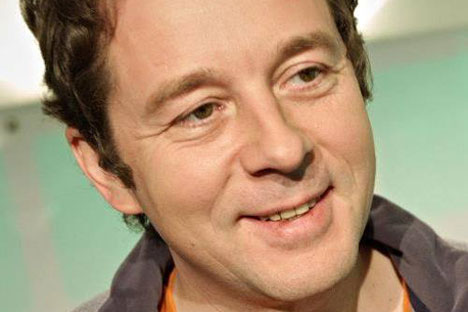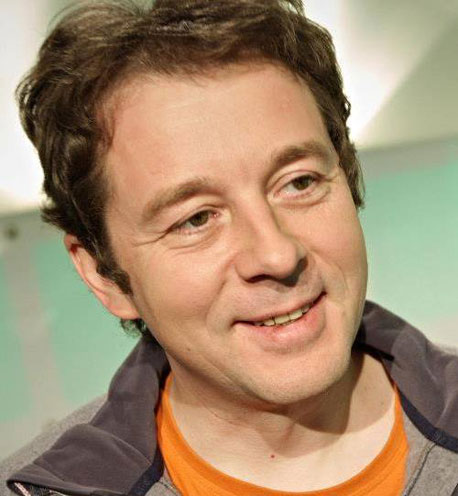Tvigle Media head: The era of linear television broadcasting is coming to an end


Egor Yakovlev: “Media is a much more profitable business than providing simple archiving and integration services.” Source: Press Photo
Television’s future is video on demand. This is the view that many Russian and foreign experts alike share. According to a report sponsored by Tvigle, by the end of 2020 the Russian OTT (Over the top) market could amount to $400mln, and up to 50 percent of this will come from pay per view and video on demand formats.
Even the major operators have come to grips with this, and are starting to offer their subscribers paid TV content. In early 2013, satellite television operator NTV-Plus announced that in the near future they would begin to broadcast over the internet using OTT technology.
Tricolor TV, Russia’s largest satellite and paid TV operator, has also started moving in that direction. Several paid TV providers, such as Vimpelcom, Megafon and Rostelecom have also announced similar plans, though they are only in the testing phase.
Egor Yakovlev, General Director of Tvigle Media, who recently spoke at TechCrunch Moscow 2013, noted that the telling signs of change in the sector were not so much analyst reports, but rather the behavior of advertisers, who are already starting to transition a large part of their budgets to internet platforms.
It’s certainly difficult to disagree. The times when people bought paper TV guides for the week ahead and sat down in front of their television sets at set times week in week out is long gone. Today, viewers needn’t look any further than their computer screens – our any other internet-connected device – to watch their favorite films or shows whenever they want.
To help understand what this comprehensive and groundbreaking research about Russia’s media market means, we interviewed Egor Yakovlev, General Director of Tvigle, thanks to whom Russian internet users have gained exclusive rights to watch South Park and Walking Dead.
Tvigle and the Online Video Market
Egor has extensive experience in the IT sector. In the 1990s this programmer from Tomsk managed to score a job as a product manager with the major systems integration company Borland. Later, Yakovlev worked in other tech companies, including Intel, organizing conferences and managing sales.
Soon after, the general director of Amedia, Alexander Akopov, invited Yakovlev to develop his mobile content business. In addition to his main role, Yakovlev also produced a cartoon parody of the company’s series “Looks aren’t everything”. The clip garnered 5 million views on the internet.
“Working at Amedia was really inspiring, because I was able to see a business that didn’t depend entirely on how much capital was invested initially. On the other hand, it was a market that was really limited by the personal views of a circle of concrete individuals and producers. Because of that, the distribution channel was also limited. That’s when we started looking at the internet as a channel for both distribution and promotion. At first we started producing behind the scenes clips, then series parodies. I even produced one of them myself. That was how we were able to rack up millions of views,” recalled Yakovlev.
Seeing that internet video was gaining a massive audience, it became clear that one could build a business on selling online ads to advertisers. Akopov and Amedia’s owner, Leonard Blavatnik, agreed to fund their employee’s experiment. However, by that time, Yakovlev was set on starting his own business and soon resigned from the company.
“Media is a much more profitable business than providing simple archiving and integration services. That’s when it became clear to us that the internet was one open frontier. It was a future that had not yet been explored and was not limited by the need to go to one gatekeeper, one person from television, who would decide what would fly and what wouldn’t. Having understood that, I resigned and launched Tvigle,” Yakovlev explained.
His goal was to create an online video platform that turns a profit. It was 2007 and there was nothing else quite like it around. Yakovlev, together with his partner Pavel Cherkashin, then director of Adobe in Russia, invested $400,000 into creating a platform for hosting and viewing video, and then they created the first version of the website.
“It was 2007. We followed the example of other successful companies, though, ironically, we outlived all of those that we had looked up to. When we started the business, I thought that we’d originate and deliver most of the content ourselves. Later on, we chiefly focused on short-form videos licensed from others. We could never have imagined that that, only a few years later, we would have the exclusive rights to premiere South Park and Walking Dead in Russia. Then came the financial crisis and we did whatever we could to get by. My conclusion is that nobody could really have predicted with any degree of certainty how this market would develop,” he commented.
Later, Allianz ROSNO investment fund agreed to buy a 40% stake in the company, investing $8mln in the startup. Tvigle began to buy rights to show films and TV series. They started producing their own content in 2008.
The company raised another round of venture capital in 2011 from Media3, the media holding owned by the Ananiev brothers who also own PromSvyazBank. Presently, approximately one quarter of the company is owned by Yakovlev, a quarter by Allianz, a third by Media3 and the rest is owned by the Tvigle management.
“The internet slashes the distance between media and viewers,” Yakovlev said. “It changes formats. People watch shorter episodes than on TV, as well as more personified stories. My main goal was building a company that could quickly adapt to the fast-changing market environment. We certainly try to forecast where the market is headed, but practice shows that even looking ahead 6 months we are only on target about 50 percent of the time. The rest of the time things go very differently from what we predicted or could have even imagined. The one thing we know for sure is that people will always want to have a good time and will always watch video. And in a country like Russia, with such a large internet audience that is only growing, the prospects for this business are huge.”
Tvigle pays license holders a fixed sum plus a percentage of advertising revenue. Today, only people based in Russia can view the international content on offer. People visiting the site from elsewhere get a message saying “If you see this message, you are in a country where we cannot show this video. We apologize…. And welcome to Russia.”
For now, Tvigle’s focus is definitely on expanding what it offers to the ever-growing Russian-speaking internet audience – in Russia and the CIS. But Yakovlev and his partners are also established experts on the broader Russian media market. Although he said Tvigle has no plans to expand beyond the CIS over the next couple of years, it remains an enticing option longer-term.
All rights reserved by Rossiyskaya Gazeta.
Subscribe
to our newsletter!
Get the week's best stories straight to your inbox



